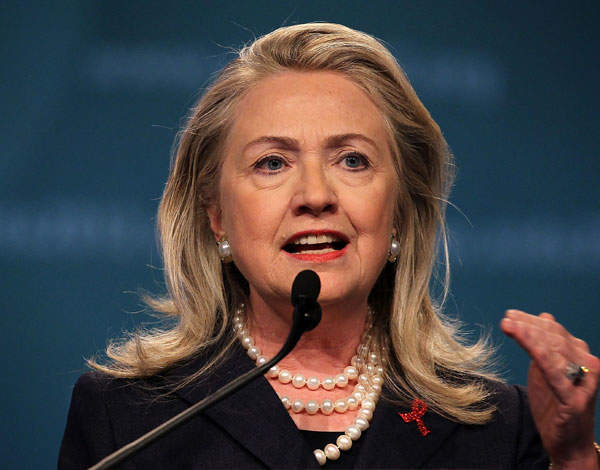

In America, the legitimate acquisition of wealth has normally been seen as a source of pride and advancement. Not so much now – at least if you ask Hillary Clinton.
Combined, the Clintons are reported to have earned well in excess of $100 million in speaking fees and books sales since vacating the White House in 2001.
Several Obama campaign advisers allegedly told the Washington Post on condition of anonymity (for fear of a Clinton backlash) that they worry her personal wealth could prove to be damaging in the run up to 2016.
‘It’s going to be a massive issue for her,’ one adviser said. ‘When you’re somebody like the secretary of state or president of the United States or first lady, you’re totally cut off [from normal activity], so your perception of the middle-class reality gets frozen in a time warp.’
Clinton wouldn’t be the only presidential hopeful to be attacked for their wealth. In 2012, Obama successfully portrayed Republican nominee Mitt Romney as an out-of-touch, job-cutting plutocrat, a consummate one-per-center in a time of middle-class malaise.
Plenty of hay was made of John McCain’s gaffe in 2008 when he couldn’t recall how many houses he owned.
Even peanut farmer Jimmy Carter (the only US president to have lived in social housing for the poor) was considered a rich and successful man by the time of his gubernatorial race in 1970.
Furthermore, at least as far as US politicians go, the Clintons aren’t all that rich – especially for a crowd who are only getting richer.
2013 was the first year in history when more than half of American lawmakers in both the House and Senate were counted as millionaires, according to analysis of financial disclosure reports compiled last year and published in the New York Times. The average net worth among all lawmakers in both chambers was $1,008,767 — a 4.4 per cent increase from 2012, according to the study.
The wealthiest of all, Darrell Issa, House representative for California’s 49th district, has a reported net worth of $460 million – far surpassing that of the Clintons. The media’s favorite presidential wildcards, Michael Bloomberg and Donald Trump (the later obviously much more of a joke), are richer still.
So you can imagine this sudden furore must all be quite strange for the former secretary of state, who will know as well as anyone that American politics is still so clearly a pay-to-play sport – after all, in the US, the never-ending fundraising is more fruitful if you know wealthy people, and by extension – are wealthy yourself.
Still, ask anyone who’s read a newspaper in the last few years and they’ll tell you that Hillary Clinton’s chances of success in 2016 are much better than either were McCain’s and Romney’s – at least as they currently stand.
Despite showing a more cumbersome, pained streak when questioned about her wealth in the primetime interviews she gave on US television last week, she’s probably best still considered a shoo-in while the Republican bench is yet to fix its clown problem.






